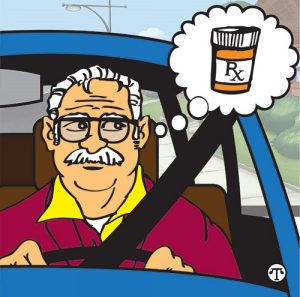 (NAPSI)—The National Highway Traffic Safety Administration (NHTSA) estimates that there are more than 38 million drivers age 65 and older. Age is not the only factor that can impact driving abilities, but it is an important one. There is evidence that most people experience age-related declines in physical and mental abilities. These changes—which can affect everything from vision to how quickly you can make decisions—influence how well you can drive. They can also be difficult to address for yourself or with older people you know, since driving often represents freedom, independence and control.
(NAPSI)—The National Highway Traffic Safety Administration (NHTSA) estimates that there are more than 38 million drivers age 65 and older. Age is not the only factor that can impact driving abilities, but it is an important one. There is evidence that most people experience age-related declines in physical and mental abilities. These changes—which can affect everything from vision to how quickly you can make decisions—influence how well you can drive. They can also be difficult to address for yourself or with older people you know, since driving often represents freedom, independence and control.
But transitioning from driving doesn’t mean you have to lose these things. Your health care providers or Area Agency on Aging (www.eldercare.gov) can point you toward a range of transportation alternatives in the community. The first step toward finding those tools is recognizing when you might need them.
Signs that an Older Adult’s Driving Skills Need Testing
So how do you know whether you or an older adult you know is developing difficulties as a driver? These issues can be warning signs that suggest that an older driver may need to be tested or evaluated:
- Getting lost in familiar areas
- Ignoring traffic signs and signals
- Becoming easily agitated or angered
- Falling asleep or being unable to concentrate when driving
- Reacting too slowly to dangerous situations
- Forgetting or ignoring driving basics (like yielding to the right of way)
- Having trouble judging distances.
Visit www.HealthinAging.org for more.
Are medicines affecting your driving? Some medications can make people feel drowsy and less alert or can limit the ability to pay attention. Some prescriptions even warn against driving. Review medications with your primary care provider or a pharmacist to see whether certain medicines might impact driving.
Cynthia Lopinto
Latest posts by Cynthia Lopinto (see all)
- Honey Chocolate–Covered Pretzels - April 3, 2018
- True Colors - April 3, 2018
- Spring Cleaning…You’ve Gotta Be Kidding - April 2, 2018
- Should You Stay In Your Home Or Move During Retirement? - April 2, 2018
- Hawaiian Plants For Good Health - April 2, 2018
 Home Front Magazine A Publication for Seniors
Home Front Magazine A Publication for Seniors

